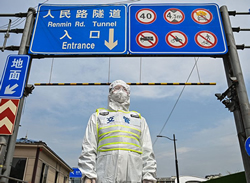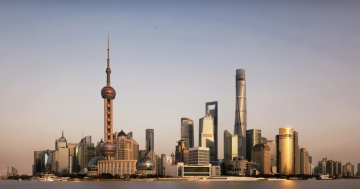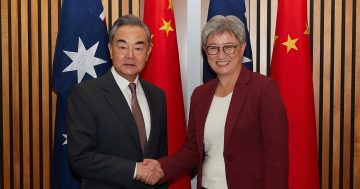Shanghai is experiencing a strict lockdown. As China’s economy takes a hit, Fengming Lu* asks if Xi Jinping will concede that his COVID-19 strategy needs adjustment?
 The lockdown in Shanghai came as a surprise to many of its 25 million residents, as well as to outside observers.
The lockdown in Shanghai came as a surprise to many of its 25 million residents, as well as to outside observers.
The Local Government had previously tried to walk a fine line between China’s rigid zero-COVID-19 strategy and maintaining Shanghai’s operation as China’s international hub.
While the strategy is regarded by many as an obsolete solution that no longer works against the Omicron variant, the Chinese Government is not ready to significantly loosen the restrictions even though they have brought significant costs to China and the world.
Lockdowns in China are drastically different from those in Melbourne or New York.
Almost all residents are forbidden to leave homes even for grocery shopping.
In the meantime, less than 10 per cent of transport and logistics workers can obtain permits and work properly.
Furthermore, strict exit and entry restrictions are imposed on the municipal border of Shanghai, further squeezing the capacity of logistics delivery.
Younger generations who have had little experience of food insecurity and are more trustful of the Government were left with little time to hoard food and household goods.
As Government food delivery is limited, Shanghai residents went into austerity modes, spending hours sourcing groceries on heavily jammed online shopping apps, some even bartering for food and goods.
Another draconian aspect of China’s lockdown policy is its prohibition on home quarantine.
Instead, even asymptomatic ‘patients’ have to stay at makeshift hospitals until they return a negative PCR test.
Conditions in many of these hastily-built facilities are horrendous, and there are simply not enough beds to keep up with the new cases which are trending at more than 20,000 a day.
While more than 99 per cent of the positive cases have mild or no symptoms, they have occupied valuable resources such as hospital beds, medical workers, and transport capacity.
Mandatory mass PCR testing across the city has created even more chances for COVID-19 infections.
The requirement of a PCR test result for receiving hospital treatment makes other patients’ situations even worse.
One tragic example: The 98-year-old mother of Shanghai-based Taiwanese economist and TV commentator, Larry Lang, who died waiting for a COVID-19 test result ahead of treatment for kidney disease.
In late March, car manufacturers such as Tesla, Volkswagen and NIO suspended production — an impact felt around the world.
A flash survey shows that almost half of German businesses’ logistics, warehousing, and supply chains were “completely disrupted or severely impacted by the current COVID-19 situation in China”.
The situation may further deteriorate if the country’s other major industrial and commercial hubs, such as Guangzhou and Hangzhou, also enter lockdown.
Concerned about the alleged side effects, China has been reluctant to boost vaccination rates among its senior citizens, who are particularly vulnerable to COVID-19.
Most Chinese senior citizens remain sceptical about the vaccines. They are mainly retired and no longer affiliated with employers, who have been assigned the responsibility of boosting vaccination rates.
As such, it could easily take months for China to achieve a high vaccination rate among the elderly.
More importantly, in order to secure his third term and minimise uncertainties before the 20th National Congress of the Chinese Communist Party (CCP) later this year, Xi has very few reasons to make a radical shift.
The resource-consuming zero-COVID-19 strategy is at least successful in minimising COVID-19 deaths, while relaxation would certainly cause even more cases and potentially, social unrest.
Although Shanghai residents’ discontent is mounting, there are few reasons to believe the Government will change its COVID-19 policies simply because of public grievances.
Collateral deaths caused by strict COVID-19 restrictions are not counted by official and published statistics, thus excluding them from Chinese officials’ assessments and ordinary people’s knowledge.
The posts and videos about the situation in Shanghai have been censored, and large-scale collective actions against the zero-COVID-19 restrictions are almost impossible to organise.
However, the Government’s terrible response has unexpectedly created room for self-governance across residential communities.
Many of the Government’s duties, especially procuring food, have been taken over by ‘group buying leaders’ (tuanzhang) who spontaneously emerged and organised residents to buy bulk groceries and meals amid lockdown restrictions.
The only reason that may convince Xi to change plans is the economy.
Although Xi is China’s most powerful leader since Deng Xiaoping, poor economic output may still jeopardise the prospect of his third term.
China’s economy recorded an impressive annual growth of 8.1 per cent in 2021, but the momentum is slowing.
Economists recently estimated that a full-scale lockdown on a major city such as Shanghai or Beijing would reduce the GDP growth by four per cent, which could bring the annual growth of 2022 to nearly zero.
However, Xi, who is highly obsessed with minimising risks, may not be fully convinced about the link between the zero-COVID-19 strategy and the worsening economic output until concrete monthly, or even quarterly figures, are in.
The costly lag in gathering and processing information recalls memories of another well-known moment in Chinese history.
Mao Zedong was not convinced about the failure of the Great Leap Forward until mid-1960, months after the abysmal harvest of 1959 was reported and the famine began to spread.
Amid the Ukraine War, China’s prolonged zero-COVID-19 strategy may disrupt its economic growth and create additional strains to the global supply chain.
*Fengming Lu is a lecturer in the Department of Political and Social Change at the Australian National University. He specialises in authoritarian politics, the role of information in politics, political economy, and elite politics in China.
This article first appeared on the website of the Australian Institute for International Affairs.











